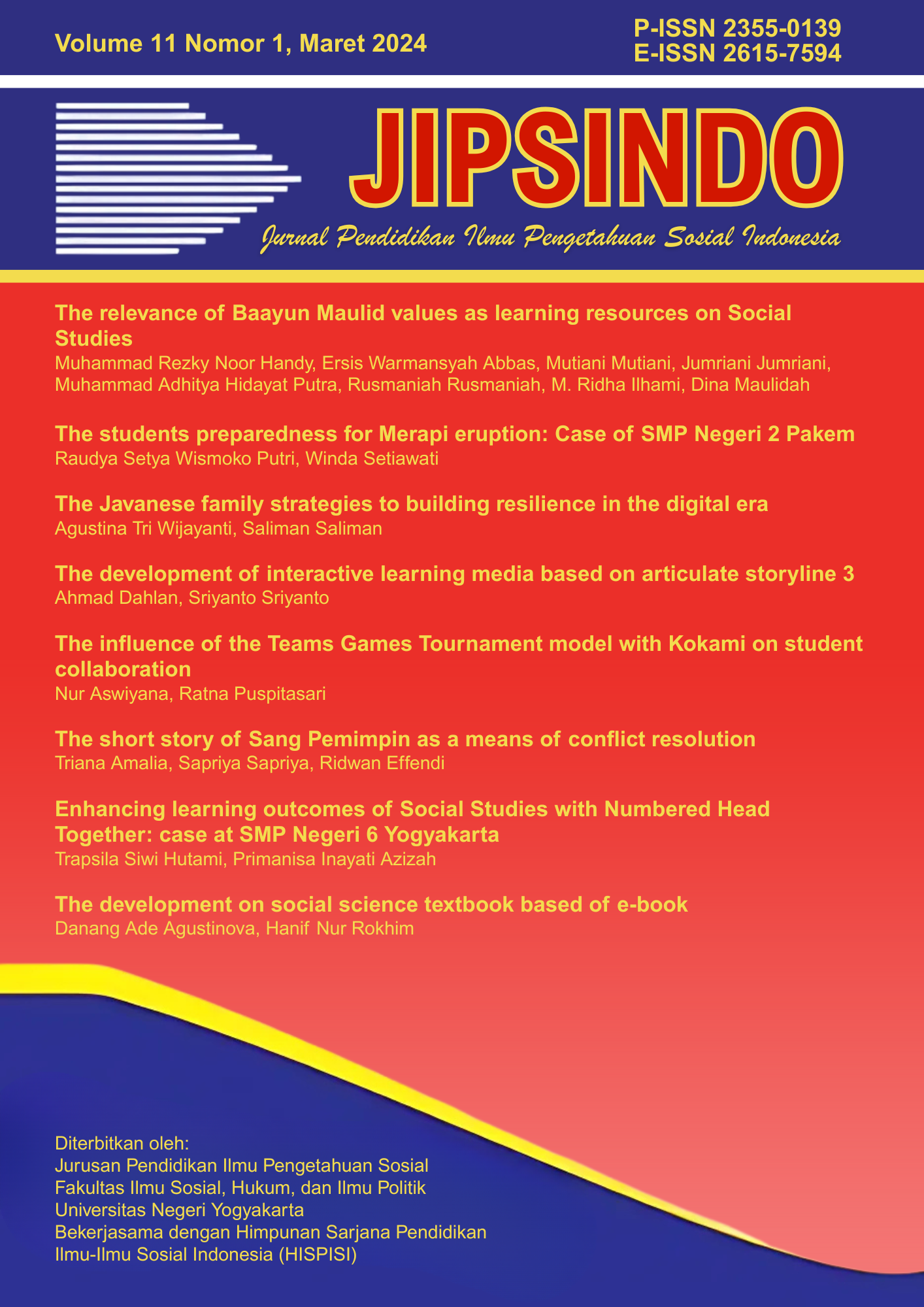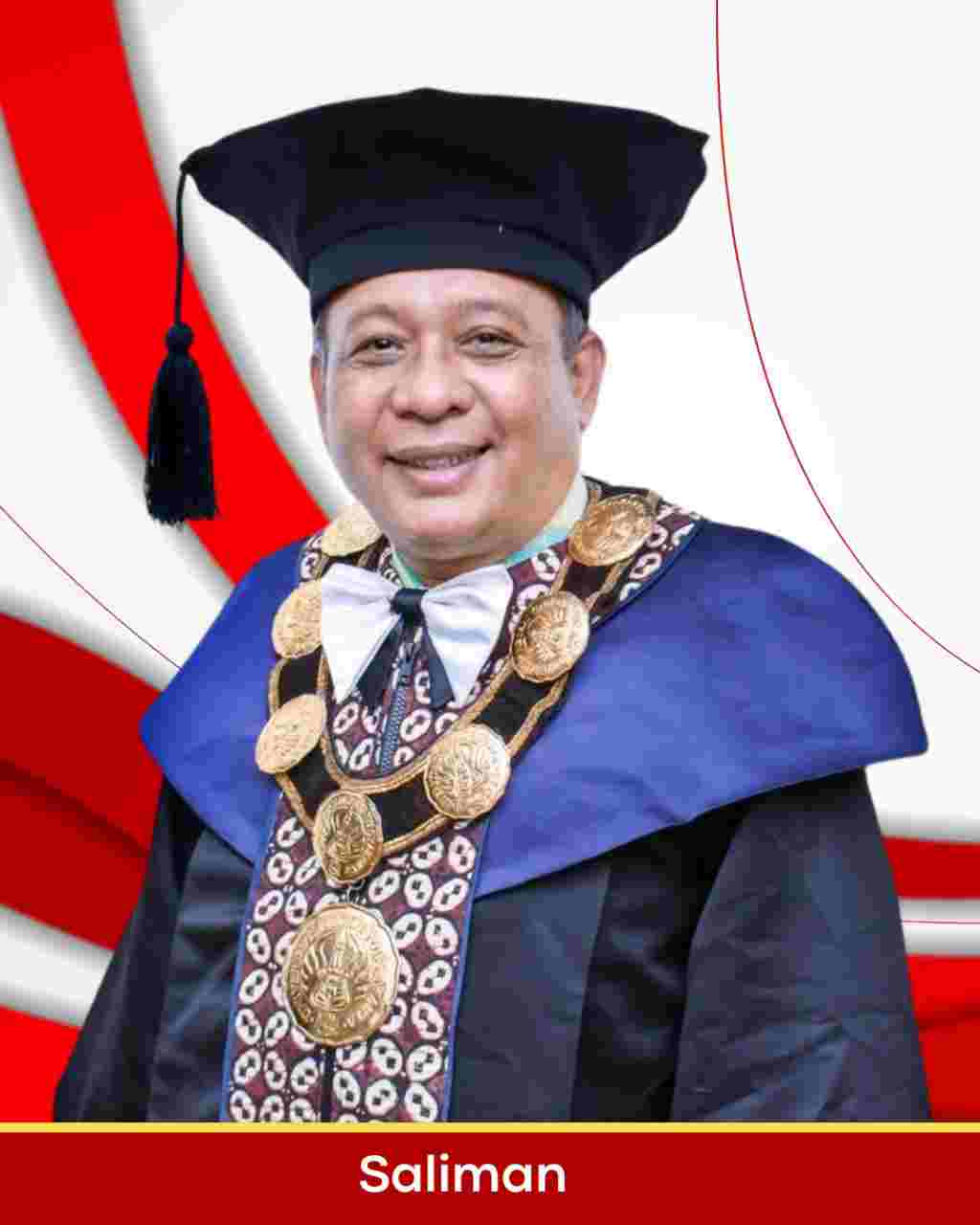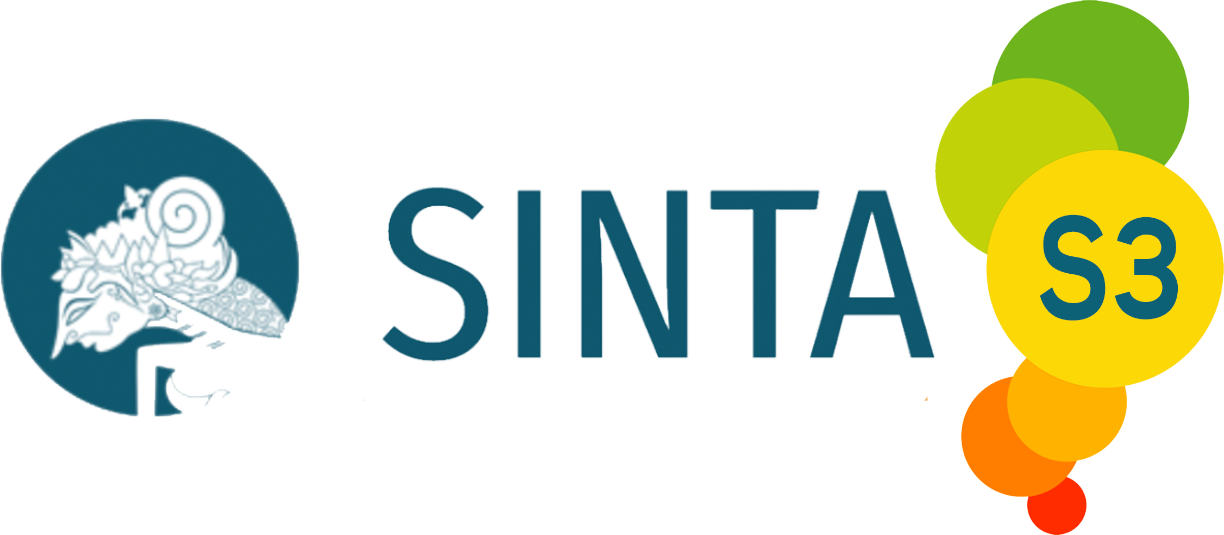The Javanese family strategies to building resilience in the digital era
DOI:
https://doi.org/10.21831/jipsindo.v11i1.71252Keywords:
Family, community, educationAbstract
References
Abbot, T. (2001). Social and personality development. Routledge.
Ainsworth, M. D. S., & Bowlby, J. (1991). An ethological approach to personality development. American Psychologist, 46(4), 333-341. doi: https://psycnet.apa.org/doi/10.1037/0003-066X.46.4.333
Apostelina, E. (2012). Family resilience in families with autistic children. Jakarta State University.
Arnet, J. J. (2007). Encyclopedia of Children Adolescents and the Media. Sage Publications
Arulsubila, M dan Subasree, R. (2016). Parenting styles influencing personality development of catering students. The International Journal of Indian Psychology Volume 4, Issue 1, No. 79, DIP: 18.01.099/20160401 doi: http://10.25215/0401.099
Aslan, A. (2019). Peran Pola Asuh Orangtua di Era Digital. Jurnal Studia Insania, 7(1), 20, https://doi.org/10.18592/jsi.v7i1.2269
Astiyanto. (2006). Filsafat Jawa menggali butir-butir kearifan lokal. Warta Pustaka.
Bates, L., Johnson, D. J., & Rana, M. (2013). Pathway to success experiences among "lost boys" of Sudan: A case study approach. In Chandi Fernando & Michael Ferrari. Handbook of Resilience in Children of war. New York : Springer
Baumrind &Thompson. (2002). Handbook of parenting: The ethics of parenting. Lawrence Erlbaum Associates, Inc.
Berk, L.E. (2000). Child development (5th ed.). Allyn and Bacon.
Bibi, F., Chaudhry, A. G., Awan, E. A., & Tariq, B. (2013). Contribution of parenting style in life domain of children. IOSR Journal of humanities and social science (IOSRJHSS), 12(2), 91-95. Diunduh dari DOI:10.9790/0837-1229195
Black, K. dan Lobo, M. (2008). A conceptual review of family resilience factors. Journal of Family Nursing, 14, 33-55.
Bogdan, R., dan Biklen, S. K. (2007). Qualitative research for education: An introduction to theory and methods (5th ed.). Boston, MA: Allyn and Bacon
Boss, P. (2013). Resilience as tolerance for ambiguity. In D. S. Becvar (ed.). handbook of family resilience. New York: Springer. doi: https://psycnet.apa.org/doi/10.1007/978-1-4614-3917-2_17
Bradley, S dan Hayes, N. (2007). Literature kajian on the support needs of parents of children with behavioural problems for barnardos, carlow. Centre for sosial and educational research dublin institute of technology. Dublin: Barnardos.
Brody, A. C. & Simmons, L. A. (2007). Family Resiliency during childhood cancer: the father perspective. Journal of Pediatric Oncology Nursing, 24(3), 152-165. http://dx.doi.org/10.1177/1043454206298844
Bronfenbrenner, U., Morris, P. A. (1998). The Ecology of Developmental Processes. In W. Damon (Series Ed.) & R. M. Lerner (Vol. Ed.), Handbook of Child Psychology: Vol. 1: Theoretical Models of Human Development. New York: Wiley
Bronfenbrenner dan Ceci. (1994). "Nature-Nurture Reconceptualized in Development Perspective; A Bioecological Model". Psycoligical Review IOJ (4); 568-686.
Budiyono, B., &; Feriandi, Y. A. (2017). Exploring the values of local wisdom of Javanese culture as a source of character education. National Seminar on Guidance and
Counseling, 1, 92–103.
Chen, Y., Lin, M. J., & Chang, C. (2009). Industrial Marketing Management The positive effects of relationship learning and absorptive capacity on innovation performance and competitive advantage in industrial markets. Industrial Marketing Management, 38(2), 152–158. https://doi.org/10.1016/j.indmarman.2008.12.003
Christine, W, S., Oktorina, M &; Mula, I. (2010). The effect of work conflict and family conflict on performance with family work conflict as an intervening variable (Study on dual career couples in Jabodetabek). Journal of Management and Entrepreneurship 12(2), 121-132.
Cohen, O., Slonim, I., Finzi, R., dan Leichtentritt, R. D. (2002). Family resilience: Israeli Mother's Perspective. The American Journal of family Therapy, 30, 173-187
Creswell, J. W. 2014. Research Design: Qualitative, Quantitative and Mixed Methods Approaches: Fourth edition. Thousand Oaks, CA: Sage Publications
Daeng, N, R. (2010). Differences in Marital Satisfaction Between Husband and Wife in
Dual Career Family. Thesis, University of North Sumatra
Darling, N., dan Steinberg, L. (1993). Parenting style as context: an integrative
model. Psychological bulletin. 487-496. doi:https://psycnet.apa.org/doi/10.1037/0033-2909.113.3.487
Dewey, J. (2004). Democracy and education: An introduction to the philosophy of education. Indian Edition. ISBN 978-81-87879-17-6. Aakar Books
Edwards, D. 2006. When Children Are Unruly: A Guide for Parents to Change Children's Behavior Problems. Bandung: PT Mizan Pustaka.
Elloy, D, F & Smith, C, R. (2003). Pattern of Stress, Work-Family Conflict, Role Conflict, Role Ambiguity, And Overload Among Dual-Career And Single Career Couple: An Australian Study. Cross cultural managemnent 10(1), 55-65
Elvika, R. R. (2019). Stress from everyday disturbances as a predictor in the formation of family resilience moderated by the role of cultural identity in the Minangkabau tribe. University of Indonesia.
Erlandson, D. A., Harris, E. L., Skipper, B. L., dan Allen, S. D. (1993). Doing naturalistic inquiry: a guide to methods. London, England: Sage
Fathi, B. (2011). Educating children with the Quran since the fetus. Jakarta: Grasindo
Fernanda Rojas, L. (2015). Factors affecting academic resilience in middle school students: A case study. Gist Education And Learning research Journal, 11(11), 63– 78.
Fouché, C. B., Dan Delport, C. S. L. (2005). The qualitative research report. In A.S.
Research at grassroots for the sosial sciences and human professions (3 rd ed.). Pretoria: Van Schaik.
Geertz, Hildred. (1983). Keluarga Jawa. Jakarta: Grafiti Pers (original work published 1961).
Geertz, H. (1961). The javanese family"”a study of kinship and sosialization. The Free Press of Glencoe, Inc., New York, 1961. Pp. xii + 176, Appendix, Index
Giddens, A. (2005). The consequences of modernity. Yogyakarta: Discourse Creations.
Goode, W. J. (2002). Sociology of the family. Jakarta: Publisher PT Bumi Aksara
Gross, J. J., & John, O. P. (2003). Individual differences in two emotion regulation processes: Implications for affect, relationships, and well-being. Journal of Personality and Social Psychology, 85, 348–362
Grusec, J. E. (2002). Parental socialization and children's acquisition of values. dalam Bornstein, M.H (ed). Handbook of Parenting, Vol. 5 Practical Issues in Parenting (2nd ed). New Jersey: Lawrence Erlbaum Associates, Inc
Hawari, D. (1997). Qur'anic Science of Psychiatry and Mental Health. Jakarta: Dana Bhakti Yasa.
Heniy Astiyanto. (2012). Filasafat Jawa Menggali Butir-butir Kearifan Lokal. Yogyakarta : Warta Pustaka.
Herrman, H., Stewart, D. E., Diaz-Granados, N., Berger, E. L., Jackson, B., & Yuen, T. (2011). What is resilience? Jpsychiatry, 56(5), 258–265.
Hidayati, L. (2016). Alternative Parenting Model in Dual-Career Family Fulfillment of Honing, Compassion, and Child Care Needs in Father-Mother Working Families in Tuban Regency. Journal of Child Education 2 (2), 41-54
Hoghughi, M. & Long, N. (2004). Handbook of parenting: Theory and research for practice. UK. SAGE Publications Ltd.
Holodynski, F. & Friedlmeier, W. (2005). Development of Emotions and Their Regulation; An Internalization Model. Springer.
Hoskins, D. H. (2014). Consequences of parenting on adolescent outcomes. Societies 2014, 4, 506–531; doi:10.3390/soc4030506. diunduh tanggal 20 November 2021.
Huang, G. H., & Gove, M. (2015). Asian parenting styles and academic achievement: views from eastern and western perspectives. Education, 135 (3), 389-397.
Hurlock, EB. 1999. Child Development. Volume 1, Sixth Edition. Translation: dr. Med. Meitasari Tjandrasa. Jakarta : Erlangga.
Indati, A. &; Ekowarni, E. 2006. The Javanese parenting gap between two generations. Journal of Psychodynamics, Vol 8, No. 1, 2006
Kalil, A. (2003). Family resilience and good child outcomes. A review of the literature. Wellington: Centre for social research and evaluation, ministry of social development: Te manatu Whakahiato Ora.
Ki Hadjar Dewantara. (1977). Part One: Education. Yogyakarta: Majelis Luhur Persatuan Taman Siswa.
Kim, J. M. S. (2006). Korean parents' disciplinary practices and socioeconomic status: An investigation based on disciplinary domains and language functions. (Disertasi) Greensboro: Faculty of The Graduate School at The University of North Carolina. Diunduh dari https://libres.uncg.edu/ir/uncg/f/umi-uncg-1165.pdf
Kerig, P., Ludlow, A., & Wenar, C. (2012). Developmental psychopathology (6th ed.). New York: McGraw-Hill education
Kroger, J. (2007). Identity development: Adolescence through adulthood. Thousand Oaks, Calif: Sage Publications.
Lebow, L., J. (2015). Hand Book of Clinical Family Therapy. Canada: Jhon Wiley & Son Inc.
Lincoln, YS. dan Guba, EG. (1995). Naturalistic inquiry. Newbury Park, CA: Sage Publications.
Lunata Ahkam. (2005). The role of self-monitoring in reducing delinquent behavior tendencies in adolescents. Makasar. Intellectual Journal. February Volume 3 No. 1
Lutfia, S & Kinanthi, M, R. (2016). Job Stress And Marital Satisfaction Among Husband in Dual-Earner Marriages. Proceedings on Social Science and Humanities, 1.
Luthar, S. S., Cicchetti, D., & Becker, B. (2000). The construct of resilience: A critical evaluation and guidelines for future work. Child Development, 71. 543-562
McCubbin, H. I, McCubbin, A.N., Thompson, I.A., Han, Y-S, dan Allen, T.C. (1997). Families Under Stress: What makes them resilient. Journal of Family and Consumer Sciences, 89(3), 2.
McCubbin, H. I., & Patterson, J. M. (1983). Family stress and adaptation to crisis. A double ABCX model of family behavior. In Olson, D. H dan Miller, B. C. Family Studies, Review Year book. (Volume 1). California: Sage Publication.
McCubbin, M. A. (1988). Family stress, resources, and family types: chronic illness in children. Family Relation, 37, 203-210.
Maccoby, E. E. (1992). The role of parents in the socialization of children: An historical overview. Developmental Psychology, 28(6), 1006-1017. https://psycnet.apa.org/doi/10.1037/0012-1649.28.6.1006
Maccoby, E. E., & Martin, J. A. (1983). Socialization in the Context of the Family: Parent-child Interaction. Dalam E. Hetherington (ed). Handbook of Child Psychology, 4. New York: Wiley.
Magnis-Suseno, Frans. (1984). Etika Jawa, Jakarta: Gramedia Pustaka Utama
Maio, G. R., & Olson, J. M. (1998). Values as truisms: evidence and implications. Journal of Personality and Social Psychology, 74, 294-311. doi: https://psycnet.apa.org/doi/10.1037/0022-3514.74.2.294
Manen, M. (1997). Researching lived experience: human science for an action sensitive pedagogy (2nd ed.). London, Ontario, Canada: The Althouse Press
Mardimin, Johanes, (1994). Don't Cry Tradition: Cultural Transformation Towards Modern Indonesian Society. Yogyakarta: Canisius
Marty Mawarpury. (2017). Resilience in the Family: A Psychological Perspective. Journal of Psychoislamedia. Volume 2, Number 1, April 2017
Masten, A. S. (2007). Resilience in developing systems: Progress and promise as the fourth waves rises. Development and Psychopatology. 19. 921- 930. doi: 10.1017/S0954579407000442
Meichenbaum, D. (2008). Bolstering resilience: Benefiting from lesson learned. diakses dari www.melissainstitute.org
Mills, Geoffrey. (2003). Action Research: A Guide for the Teacher Researcher. New Jersey: Prentice Hall.
Min, J-A., Yu, J.J., Lee, C-U., & Chae, J.-H. (2013). Cognitive emotion regulation strategies contributing to resilience in patients with depression and/or anxiety disorders. Comprehensive Psychiatry, 54, 1190–1197.
Myers, H. F. & Taylor, S. (1998). Family contribution to risk and resilience in African American Children. Journal of Comparative Family Studies, 29,1.
Nevid, J. S., Rathus, S. P., Greene, B. (2005). Abnormal Psychology (5th ed.). Jakarta:
Publisher Erlangga
Niaz, V. (2006). Role of faith and relience in recovery from psycho-trauma. Pakistan Journal of Medical Sciences Quarterly, 22(2), 204-207.
Nichols, W. C. (2013). Roads to understanding family resilience: 1920s to the twenty-first century. In In D.S. Becvar (ed). Handbook of family resilience. New York: Springer Science. Business Media
Patterson, J. M. (2002). Integrating Family resilience and family stress theory. Journal of Marriage and Family, 64, 349-360.
Patterson, J. M. (2002). Understanding family resilience. Journal of clinical Psychology, 58(3), 233-246.
Pietkiewicz, I. (2014). A practical guide to using interpretative phenomenological analysis in qualitative research psychology. Czasopismo Psychologiczne – Psychological Journal, 20, 1, 2014, 7-14. Doi:10.14691/CPPJ.20.1.7
Pinem, Saroha. (2009). Reproductive Health and Contraception. Jakarta: Trans Media
Poegoeh, D.P., &; H. (2016). The role of social support and emotion regulation on the resilience of schizophrenic families. Insan, 1(1), 12–21.
Polkinghorne, D. E. (1989). Phenomenological research methods. in r. s. valle dan s. halling (eds.), Existential-phenomenological perspectives in psychology (pp. 41-60). New York, NY: Plenu
Pendit, Putu Laxman. (2005). Library and Information Science Research: An introduction to Epistimology and Methodology Discussion, Jakarta: JIP-FSUI.
Pressley, M., & McCormick, C. B. (2007). Child and Adolescent Development For Educator. New York: The Guildford Press
Rahardjo, S. (2012). Ki Hajar Dewantara: Biografi Singkat 1889-1959. Yogyakarta: Ar-Ruzzmedia.
Reivich, K. and Shatté, A. (2002). The Resilience Factor: 7 Essential Skills for Overcoming Life's Inevitable Obstacles. Broadway Books
Richardson, G. E. (2002). The Metatheory of Resilience and Resiliency. Journal of Clinical Psychology, 58(3), 307-321
Ritzer, George. (2009). Sociology: A Science with Dual Paradigms. Jakarta: Rajawali Pres
Rochayanti, et al. (2012). Socialization of Local Culture in Javanese Families. Journal of Communication Sciences. Volume 10. Number 3. August 2012. pp. 308-320
Rosli, Noor A. (2014). Effect of parenting styles on children's emotional and behavioral problems among different ethnicities of muslim children in the u.s. Dissertations (2009). Paper 376. http://epublications.marquette.edu/dissertations_mu/376
Salkind, N. J. (2009). Theories of human development. (Translation. M. Khozim) (Original Edition published in 2004 by Sage Publication New Delhi).
Sandi-Urena, Santiago. (2018). Phenomenological approaches to study learning in the tertiary level chemistry laboratory. Química Nova, 41(2), 236242. https://dx.doi.org/10.21577/0100-4042.20170176
Santrock, J. W. (2002). Life-span Development: Lifelong Development Fifth Edition Volume 2. Erlangga: Jakarta.
Santrock, J. W. (2008). Educational psychology (3rdEd.). New York: McGraw- Hill. Sarwono, S.W. (2002). Psikologi Remaja. Jakarta. Rajawali Pres
Saeroji, F. E. (2010). Family resilience. Downloaded from: www.atfahmi.depsos.org/2010/07/13/ resilience-family, September 10, 2021
Sixbey, M. Tucker. (2005). Development Of The Family Resilience Assessment Scale to Identify Family Resilience Constructs. Disertasi. University of Florida. doi: https://psycnet.apa.org/doi/10.1037/t58070-000
Smith, C, R. (1992). Trends And Directions in Dual-Career Family Research. Women in Management Review, 7(1), 23-28.
Suseno, F. M. (1984). Javanese Ethics: A Philosophical Analysis of Javanese Life Wisdom. Jakarta (ID): Gramedia Pustaka Utama.
Strahaar, Joseph dan Robert La Rose. (2002). Media Now: Communication Media in the Information Age: Australia: Wadsworth
Streubert H. J., dan Carpenter D. R. (2010). Qualitative research in nursing: advancing the humanistic imperative (5 th ed.). Philadelphia, PA: Lippincott Williams dan Wilkins.
Talib, J., Mohamad, Z., & Mamat, M. (2011). Effects of parenting style on children development. World Journal of Social Sciences, 1(2), 14-35. Diunduh dari https://pdfs.semanticscholar.org/4d1b/d5803fd42f4e15001b5ba2ae1a1b5215cf05.pdf
Taylor, S. L., Bogdan, R., DeVault, M. L. (2016). Introduction to qualitative research methods: a guidebook and resource (4th ed.). Hoboken, NJ: John Wiley.
Tugade, M. M., & Fredricson, B. L. (2004). Resilient individuals use positive emotions to bounce back from negative emotional experiences. Journal of Personality and Social Psychology, 86 (2), 320 – 333
Walsh, F. (2006). Strengthening Family Resilience (third edition). New York: The Guilford Press.
Walsh, F. (1996). The concept of family resilience: Crisis and challenge. Fam Proc 35: 261-281. doi: http://10.1111/j.1545-5300.1996.00261.x
Walsh, F. (2002). A family resilience framework: Innovative practice aplication.
Family Relations, Vol. 51, No. 2, 130-137. doi: http://dx.doi.org/10.1111/j.1741-3729.2002.00130.x
Walsh, F. (2003). Family resilience: A framework for clinical practice. Family Process, 42(1), 1-18. doi: https://doi.org/10.1111/j.1545-5300.2003.00001.x
Walsh, F. (2006). Strengthening Family Resilience 2nd Edition. New York: The Guilford Press.
Walsh, F. (2007). Traumatic loss and major disasters: Strengthening family and community resilience. Family Process, 46(2), 207. doi: https://doi.org/10.1111/j.1545-5300.2007.00205.x
Walsh, F. (2012). Strengthening family resilience: Overcoming life challenges. In Scabini, E., & Rossi, G. (eds.). Family Transitions and Families in Transition. Milan: Centre for Studies and Research on the Family, Catholic University of the Sacred Heart.
Wardani, F. L. R. &; Uyun, Z. (2017) "Ngajeni wong liyo"; respect for elders in ethnic Javanese adolescents. Indigenous: Scientific Journal of Psychology, 2 (2), 176-183. downloaded from http://journals.ums.ac.id/index.php/indigenous/article/download/5681/3793
Welman, J. C., dan Kruger, S. J. (1999). Research methodology for the business and administrative sciences. Johannesburg, South Africa: International Thompson.
Widyarini, N. (2009). Popular Psychology Series: Parent-Child Relations. Jakarta: Elek Media Komputindo.
Wiryopranoto, S. et al. (2017). Ki Hajar Dewantara: His Thoughts and Struggles. Jakarta: Ministry of Education and Culture.
Wulandari. (2009). The relationship between Javanese values and strategies to deal with problems in old age. Yogyakarta: Faculty of Psychology Universitas Gadjah Mada.
Yuksel, P dan Yildirim, S. (2015). Theoretical frameworks, methods, and procedures for conducting phenomenological studies in educational settings. Turkish online journal of qualitative inquiry, January 2015, 6(1).
Zhang, Y. B., Lin, M. C., Nonaka, A., & Beom, K. (2005). Harmony, hierarchy and conservatism: a cross-cultural comparison of Confucian values in China, Korea, Japan, and Taiwan. Communication Research Reports, 22(2), 107–115, doi: https://doi.org/10.1080/00036810500130539
Downloads
Published
How to Cite
Issue
Section
Citation Check
License
Authors who publish with this journal agree to the following terms:
- Authors retain copyright and grant the journal right of first publication with the work simultaneously licensed under a Creative Commons Attribution License that allows others to share the work with an acknowledgement of the work's authorship and initial publication in this journal.
- Authors are able to enter into separate, additional contractual arrangements for the non-exclusive distribution of the journal's published version of the work (e.g., post it to an institutional repository or publish it in a book), with an acknowledgement of its initial publication in this journal.
- Authors are permitted and encouraged to post their work online (e.g., in institutional repositories or on their website) prior to and during the submission process, as it can lead to productive exchanges, as well as earlier and greater citation of published work (See The Effect of Open Access).

JIPSINDO (Jurnal Pendidikan Ilmu Pengetahuan Sosial Indonesia) is licensed under a Creative Commons Attribution-ShareAlike 4.0 International License.
Based on a work at https://journal.uny.ac.id/index.php/jipsindo.
















